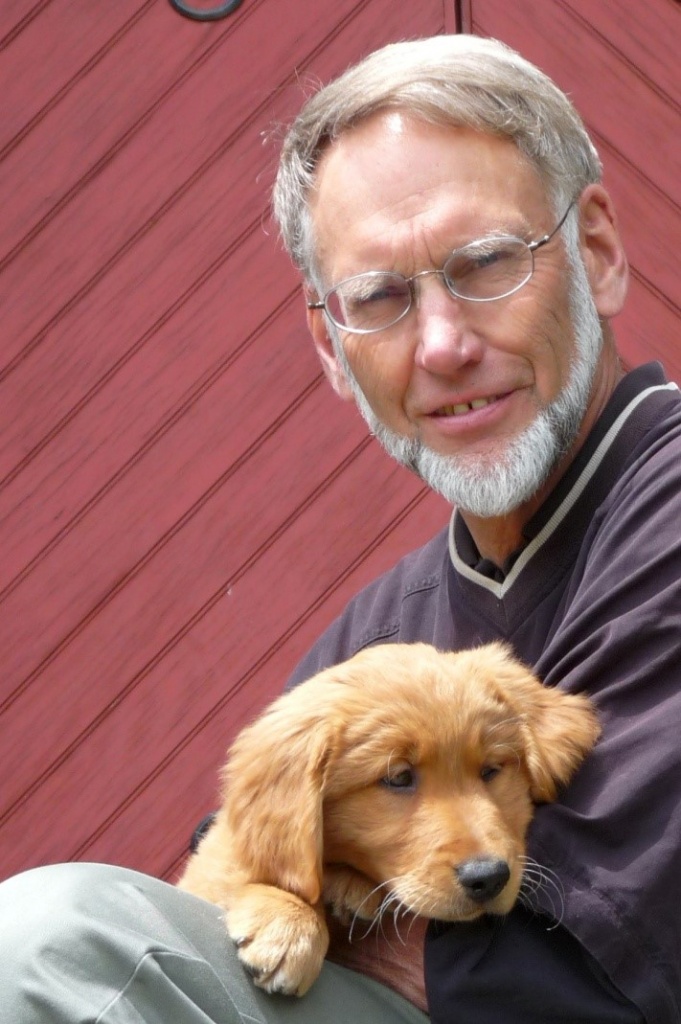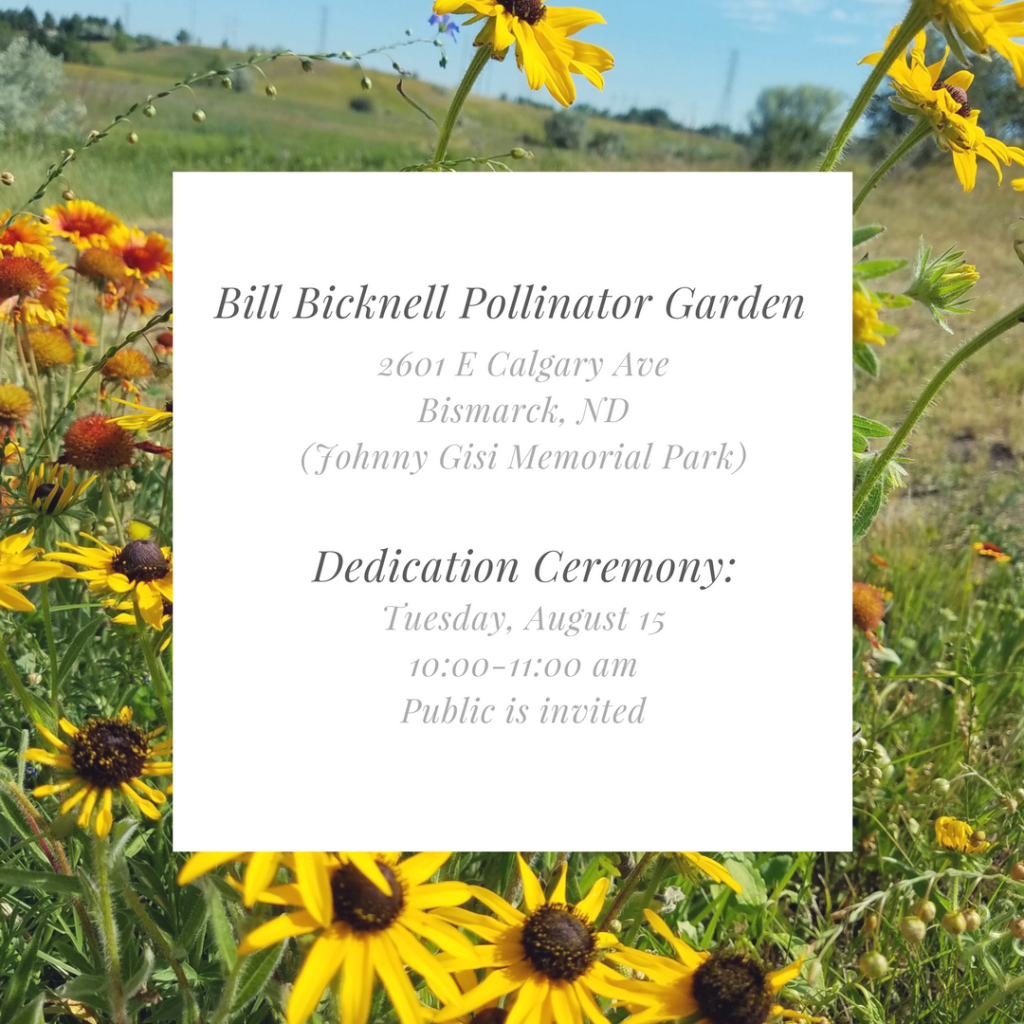
Bill Bicknell
By Marci Narum
A man cannot predict his own legacy, nor whether it will be physical or intangible. Bill Bicknell’s is both.
Bill was all about nature and nurture. As a biologist for more than 30 years, he kept diligent notes about everything he saw in the field—birds, insects, animals—whether at work, in his garden, or hunting. But Bill was also known by people in his professional and personal life as a man who nurtured relationships.
Retired biologists, Al Sapa and Dave Dewald, worked with Bill for 20 years. The three became friends on the job at the U.S. Fish and Wildlife Service in Bismarck, North Dakota.
“If you needed a person to work with somebody, he was the guy,” Al remembers. “Because he could build relationships, which is everything when you’re in government, you’ve got to have relationships.”
“He was a consensus-builder too,” Dave adds. “If he had people that were on other ends of the pendulum, he was going to bring them together.”
“It was such an important thing to him to be able to get people to sit down and talk and find common ground,” explains Bill’s widow, Sue Bicknell.
And so it’s quite fitting that an idea Bill started in 2015 is now in full bloom and giving people a place to connect and share common ground. The Bill Bicknell Memorial Pollinator Garden is a tangible part of his legacy; a place for nature and nurture.
“Bill had this idea that a pollinator garden would be a good fit for Bismarck,” Sue recalls. “And I think it was Dave who said, ‘good idea Bill, do it!’”
Not being one to sit on a good idea, Bill enlisted the help of Dave and Al, and their friends at the Lewis and Clark Wildlife Club to get the project rolling in the summer of 2015. They worked with the Bismarck Parks and Recreation district to locate land and began working the ground that fall.
“The timing was perfect because this park was just being developed,” Dave remembers. “The city had just put in the observation corner and walkway, and just hauled in a lot of soil so they had a bare spot that needed to be covered with something. So Bill got that going with Parks and Rec.”
Over the winter the group ordered seeds and plants, and contacted The Xerces Society (https://xerces.org/) for support and information. In the spring of 2016, planting the pollinator garden began with help from the Girl Scouts, Boy Scouts, and USDA Plant Materials Center in Bismarck.
Bill died December 19, 2015. He never got to see his project come to life.
Enduring an extremely dry summer, the pollinator garden still continues to grow during its second season and it serves the purpose Bill intended: to raise awareness about the crash of pollinators in recent years. Pollinators are critical for agriculture and the U.S. food system; Bill wanted to show others how to help butterflies, bees, and birds thrive.
“Bill and these two guys are all retired biologists so there’s a heightened awareness of what’s going on in the world when you work in the field,” Sue explains. “For years there have been articles on monarchs; the crash of the monarch population and the crash of the meadowlark population. Particularly the bees, the hive collapse syndrome. The honey bees are an introduced species but they are a big deal on this continent now because they do the heavy lifting when it comes to pollinating now for agriculture.
“But the monarchs are such a visible, recognizable species that if you want to raise awareness of this type of decline you want a poster child and the monarch is the go-to critter for that, for the pollinator bunch. They are beautiful, people know what they are, and kids love them. So Bill thought this would be a great way to raise awareness in Bismarck, get people involved, and encourage people to do it in their backyards.”
In its first summer, the pollinator garden generated a lot of excitement, especially when 40 monarch butterflies showed up during their migration.
“A friend of mine came up with her kids and they were standing right next to that (plant?) and the butterflies were all over them,” Sue says. “She said the kids were so excited!”
Members of the Lewis and Clark Wildlife Club hope the excitement builds.
“I put plants in my yard and a couple other yards,” says Al. “So we’ve got a start with pollinators. Now if we can get those monarchs going we’ll be in good shape.”
“I was down here taking pictures and a man was jogging by and he saw me with my camera,” Sue says. “He stopped to talk and said, ‘I’ve admired this garden and I’m building a building for my business and I’m wondering how to landscape it. This would be the perfect thing.’ I got his email and sent him the list of plants that we had put in here and some contacts for him to buy plants.”
“The Friends of Audubon came down for a tour,” Dave adds. “It’s small steps.”
“Bill was a gardener—big time,” explains Sue. “He thought this would be a great way to help the pollinator population. If you get a certain population in Bismarck who had the right kind of plants in their yards, it would help. One little garden is probably not going to turn the tide. Maybe 100 won’t turn the tide but you’ve got to try and that was his idea, to just get this garden someplace in Bismarck where people would see it when they were walking by.
“It’s just the beginning, says Al. “There are lots of other things that can happen out here related to pollinators.”
Sue says Bill’s legacy is a way of life and an outlook that shaped the things that were important to him: nature and nurture.
“For him this was a natural progression from growing vegetables in your backyard to supporting the critters that make all that happen, which is the pollinators. He thought, naturally, everybody would be enthusiastic about this. I hope he’s right. I think it’s easy for people to identify a monarch and be excited. Maybe not a bee, a hover fly, or a mosquito—because mosquitoes pollinate as well—but the butterfly is an easy one to put in front of the public and say, ‘you can help these critters.’”
Click here to watch a walking tour video of the pollinator garden.
Inspired to start your own pollinator garden? Click here to learn more.

